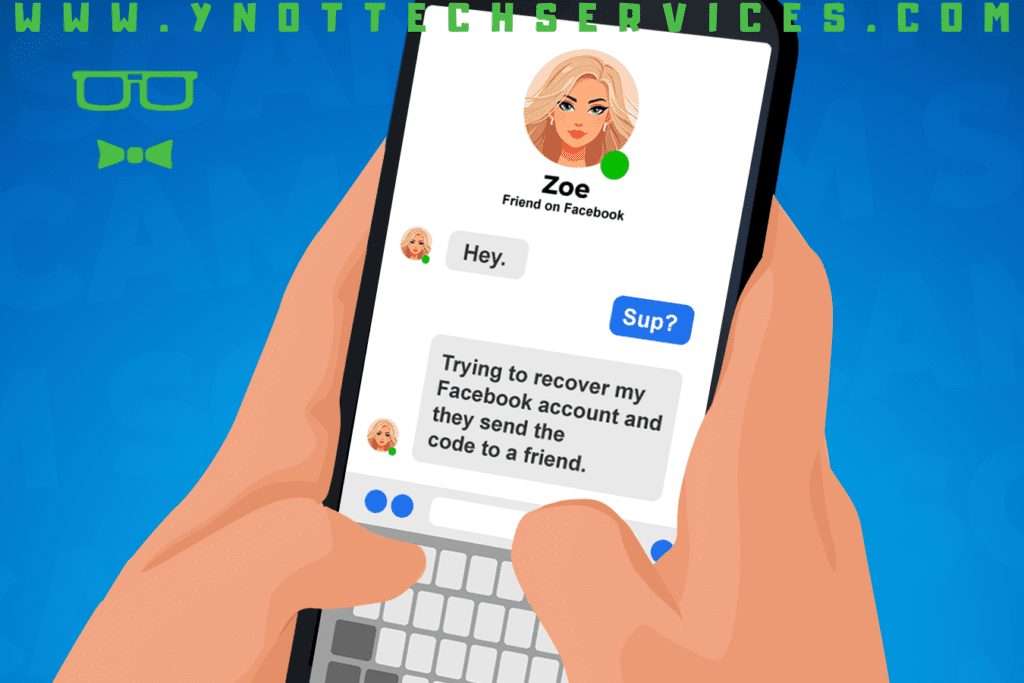How Scammers Use Your Friends to Steal Your Facebook Account
Imagine you receive a message from a friend asking for a little help. They say they are trying to get back into their Facebook account, and they need a special login code that Facebook will send to a trusted friend.
It sounds simple, right? You want to help your friend out, but here’s the catch: the code they are asking for is actually the key to your account, not theirs. Let’s dive into how this scam works and how you can protect yourself.
How does this Facebook scam work?
A friend asking for help
The scam usually starts with a message from someone on your friend list. It could look like they need help recovering their Facebook account or logging in on a new device. They tell you that Facebook will send a verification code to their friends, and they need you to share that code with them.
The message comes from someone you know, and they’re asking for help. It seems harmless, maybe even urgent, and who wouldn’t want to help out a friend in need?
The real danger behind the code
The big problem is that the requested code isn’t meant for their account. It’s the code to access your Facebook account. When Facebook sees someone trying to log in from an unfamiliar location or device, it sends a code to the account owner to confirm that it’s really them trying to log in. This code could be sent via text or email, as part of Facebook’s two-factor authentication process.
The scammer posing as your friend is actually trying to get into your Facebook account by tricking you into giving them this code.
Where it gets even trickier
This scam can feel especially convincing for a couple of reasons. First, the person reaching out might be using a fake account that looks exactly like your friend’s, with the same name and profile picture. However, in many cases, the scammer might actually be using your real friend’s account. They managed to compromise your friend’s account first, and now they are using it to trick more people – like you. It’s a chain reaction, where each hacked account leads to more and more victims.
How to protect yourself from this scam
Verify before you act
If a friend messages you asking for a code to help them recover their account, take a moment to verify things first. Don’t feel rushed. Scammers often rely on creating a sense of urgency. Call your friend directly or message them on another platform to confirm that it’s really them.
Never share login codes
Remember, any code that Facebook sends to you is meant to protect your account. It should never be shared with anyone, not even friends. If someone asks for a code sent to you, it’s a red flag.
Look out for cloned accounts
If you receive an unusual request from a friend, check their profile. Look at their recent posts, photos, or activity. If anything feels off or incomplete, it could be a fake account designed to look like your friend.
What to do if you fall victim to the scam
If you’ve already shared a code and suspect someone might have accessed your Facebook account, here are the steps you should take immediately:
- Change your password. Update your Facebook password as soon as possible. Make it something unique and hard to guess.
- Enable two-factor authentication. This adds another layer of security to your account. You can set it up so that login attempts require a code from your phone.
- Report the incident. Inform Facebook that your account may have been compromised. They can help secure your account and investigate further.
We’re here to help keep you safe online
Navigating the internet can be tricky, and scams like this are getting more sophisticated every day. If you need help securing your devices, give us a call. We’re here to look after you and make sure your online experience stays as trouble-free as possible.
Stay alert, stay safe
Remember, a little bit of caution can go a long way towards keeping your accounts and personal information safe. If you’re ever in doubt about a message or request, it’s always better to double-check. Scammers count on us to act quickly without thinking things through. Let’s not give them the chance.
We’re always just a phone call away if you need help or advice. Stay safe out there!



